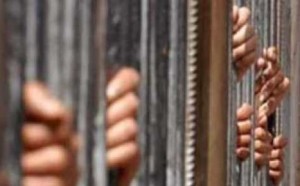
The National Council for Human Rights (NCHR) released a report on Friday describing in detail the situation inside high security prison Tora 992, more commonly known as Al-Aqrab prison.
The delegation visited the prison on Thursday, 16 May, one day after they were granted permission by Prosecutor General Tala’at Abdullah. The visit lasted seven hours, in which the delegation met with several top prison officials.
The prison is divided into wards 1, 2, 3, and 4, each of them divided into a further four sectors with each sector containing 20 cells and a bathroom. Each cell has between three and four prisoners, “except in the case of ‘Political Islam prisoners,’ who have an entire sector allocated to them. They are a total of 19 prisoners, some of them serving sentences and others are on remand,” the report said.
All prisoners are staying in wards number 1 and 2. One of the remaining two wards is currently under construction and the other contains no prisoners.
The report states that the cells inside ward 1 are rickety and electricity wires inside the ward are uncovered. The ward hosts 245 prisoners but the sewage network is not set up to handle this number causing poor hygiene conditions. The place crawls with cockroaches, mice, mosquitoes, flies and cats. The number of inmates is also affecting air quality inside the ward. “Pure air becomes a crisis that requires immediate intervention,” the report said.
Ward number 2 is made up of four sectors as well. The first is the one that includes the 19 Islamist prisoners. “It has the best conditions in the prison in terms of hygiene and the number of prisoners,” the report said, adding that because of their small numbers, every inmate gets his own cell.
The fourth sector hosts only four detainees who are being held on remand for alleged involvement in Black Bloc activities. The four have chosen to stay in one cell instead of three staying together and one remaining alone or staying in a cell each. The cell they are staying in is very hot and is not well ventilated. Prison officials promised the delegation that a fan will be provided for them soon. The four detainees have been assaulted physically and verbally.
While the law allows families to visit inmates once a week, the four detainees said their families were only allowed to see them once during their stay of over a month in prison. They were also not allowed to take their exams.
The prison also has nine detainees who have been or remand longer than the amount of time allowed. Among them are two who have been in prison since 2004 and three who have been in prison since 2005. The council has sent a memo regarding these nine to the prosecutor general.
The visit to Al-Aqrab prison is part of a series of visits the council plans to pay to prisons after deciding in a meeting on 19 May that there is a need for a strategy to reform penal institutions. The decision stemmed out of the council’s concerns due to deterioration of infrastructure, safety criteria, and healthcare, in addition to the overcrowding of prisons.
The council urgently called for the need of treating all inmates based on the international standards of treating prisoners, without any discrimination, renovating wards to provide the basic human needs and following up on the health of prisoners and providing them with needed surgery without delay. Among its demands were also providing students with the appropriate conditions to take their tests and access books, as well as setting up classes to eradicate illiteracy.

